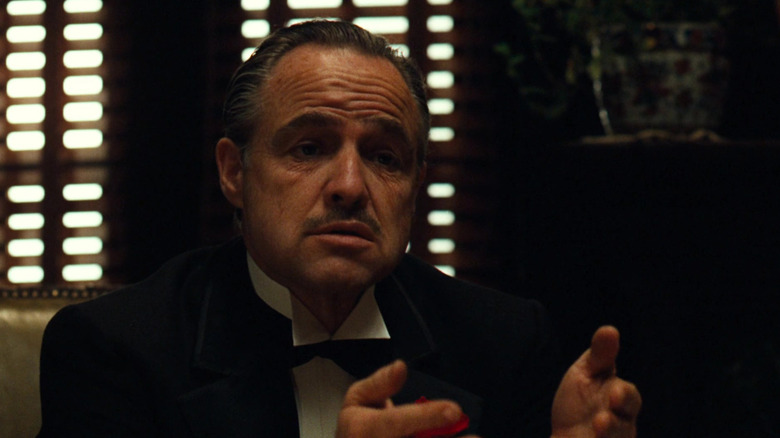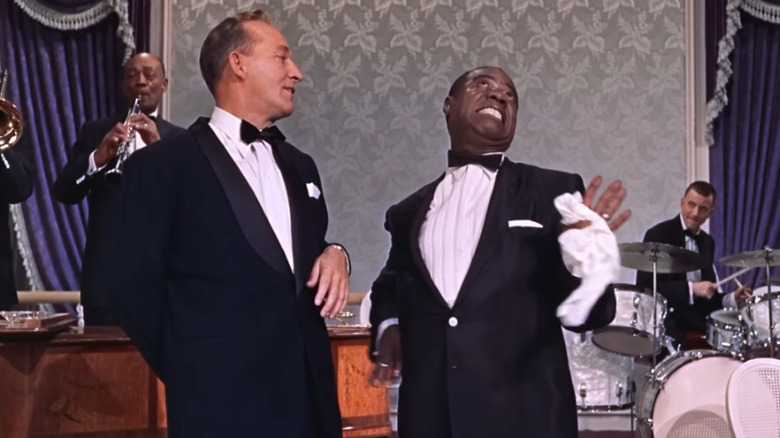This Is What Happens When An Oscar Nomination Gets Vetoed
If you've ever watched the red carpet at the Academy Awards there's a phrase you've probably heard over and over again, and for quite a few decades: "It's an honor just to be nominated."
And to be fair, it most certainly is. Although the Oscars were invented to bust unions, not reward artistic quality, at their best it's a gesture of support for a filmmaker from their peers. To be singled out by the other hard-working artisans in your branch as worthy of awards consideration as an actor, director, writer, cinematographer, sound designer et al is a great big feather in one's cap.
But it's a feather that can, and has been, plucked out. It's uncommon but the Academy Awards have vetoed quite a few nominations in the past — three times in the 2010s alone — in situations that stirred up controversy or, in some of the more technical or niche categories, went largely unobserved.
This is what happens when an Oscar nomination gets vetoed.
Nominated yet not nominated
The year is 2014 and the Academy Awards nominations had a few surprises. It still seems weird that Tom Hanks didn't receive a Best Actor nomination for "Captain Phillips," despite turning in one of his most acclaimed performances, nor was he nominated for Best Supporting Actor for his heavily promoted turn as Walt Disney in "Saving Mr. Banks."
But the biggest surprise wasn't a snub, it was a nomination for a film most audiences had never even heard of. "Alone Yet Not Alone" is a Christian historical film about three young girls who are kidnapped, forced to live among, and then ultimately escape, a tribe of Lenape in the mid-18th century. The film grossed less than a million dollars at the box office, it only has one review on Rotten Tomatoes (although it's a favorable one), and it was not considered a major contender for any Academy Award.
So the nomination for "Alone Yet Not Alone" in the Best Original Song category — alongside songs from "Frozen," "Despicable Me 2," "Her," and "Mandela: Long Walk to Freedom" — raised a few eyebrows, and also a few red flags. The Academy soon discovered that one of the songwriters, Bruce Broughton, formerly a governor and at the time a committee member in the Music Branch, had directly contacted Academy voters via email to raise awareness of his film, which is against the rules.
According to the then-Academy President Cheryl Boone Isaacs, "No matter how well-intentioned the communication, using one's position as a former governor and current executive committee member to personally promote one's own Oscar submission creates the appearance of an unfair advantage."
The nomination was stricken, and in accordance with recent rules, no replacement nomination was made. There were only four nominees that year and rather predictably, "Let It Go" from "Frozen" won.
I know it was you, Nino Rota, you broke my heart
At the 89th Academy Awards, Michael Bay's "13 Hours: The Secret Soldiers of Benghazi" was nominated for Best Sound Mixing and although the film's nomination remained intact, one of the sound designers had their name removed from the ballot. The Academy determined that Greg P. Russell — who has been nominated 16 times, yet never won — lobbied his fellow branch members via telephone to campaign for the award. As this broke Academy rules, Russell's nomination was removed, although the three other nominees for "13 Hours" — Gary Summers, Jeffrey J. Haboush, and Mac Ruth — remained on the ballot. "13 Hours" lost to "Hacksaw Ridge."
It's not always about campaign violations though, as there are plenty of other ways to break the rules. The film "Tuba Atlantic" had its Oscar nomination for Best Live-Action Short Subject retroactively vetoed after it was revealed, after the ceremony, that the film had aired on television before it screened in theaters, which violated the rules of eligibility.
Heck, even "The Godfather" fell victim to controversy. Francis Ford Coppola's classic film was nominated for Best Original Dramatic Score until the Academy discovered that composer Nino Rota had re-used elements of a score he had written for Eduardo De Filippo's 1958 comedy "Fortunella," which rendered his work ineligible. Although the Oscars currently rule that a vetoed nomination will not be replaced on the ballot with the next runner-up, the nomination for "The Godfather" was indeed replaced by John Addison's score for "Sleuth." It lost to the Charlie Chaplin re-release "Limelight."
It all worked out for Rota, however: He won an Oscar in the same category just two years later, for "The Godfather Part II."
Hell or 'High Society'
Yes, there sure are plenty of ways to get your Oscar nomination revoked. The 1992 film "A Place in the World" was Uruguay's submission for Best International Feature, only to have its nomination vetoed because it was mostly an Argentinean production. The 1953 John Wayne 3D western "Hondo" was nominated for Best Story before being disqualified since it was based on a pre-existing short story, "The Gift of Cochise."
Perhaps the most embarrassing case was the documentary "Young Americans," which won the Best Documentary Feature award at the 41st Academy Awards, only for the Academy to later discover that the film had played in a theater a year earlier than reported, making it ineligible for that particular ceremony. It's the only time to date that an Academy Award has been revoked after it has been won. The Oscar was instead given to the next runner-up. In this case, the new winner was the documentary "Journey Into Self."
Sometimes the errors are frustratingly clerical, but sometimes the reasons are just plain funny. Edward Bernds and Elwood Ullman were nominated for Best Motion Picture Story for their work on the 1956 musical "High Society," starring Bing Crosby, Grace Kelly, Frank Sinatra, and Louis Armstrong. The only problem was that Bernds and Ullman didn't write that movie. They wrote a 1955 Bowery Boys comedy that just happened to have the same name. Bernds and Ullman were pretty cool about it and declined the nomination because, well, obviously they weren't supposed to be there.
No campaign, no gain?
That one weird mix-up aside, there do seem to be two consistent reasons why Oscar nominations get vetoed. The first is that they should not have been eligible in the first place, which is hard to argue, and the second is for violating campaign rules, which is a comparatively grey area.
Again, the Oscars are a popularity contest anyway. Is it really so bad to have people reaching out to fellow Academy members, especially in regards to obscure films like "Alone Yet Not Alone" or the recent, controversial nomination for "To Leslie," whose nomination for Best Actress was briefly debated and then, ultimately, accepted? How can a grassroots campaign possibly take hold in an environment where it seems like only the films and studios with the most publicity and money can get their movies noticed?
Then again, that raises another question. As Christina Ricci recently asked via Instagram, "So it's only the films and actors that can afford the campaigns that deserve recognition? Feels elitist and exclusive and frankly very backward to me."
She's got a point, but the Oscars have always been elitist and exclusive and, arguably, very backward. And perhaps switching the Academy Awards from a contest between who has the most money to a contest between who has the most celebrities on their contact list would be more of a lateral move.
Maybe there's just no great way to campaign for a gold statue. Maybe the whole system is a little bit arbitrary and misguided.




